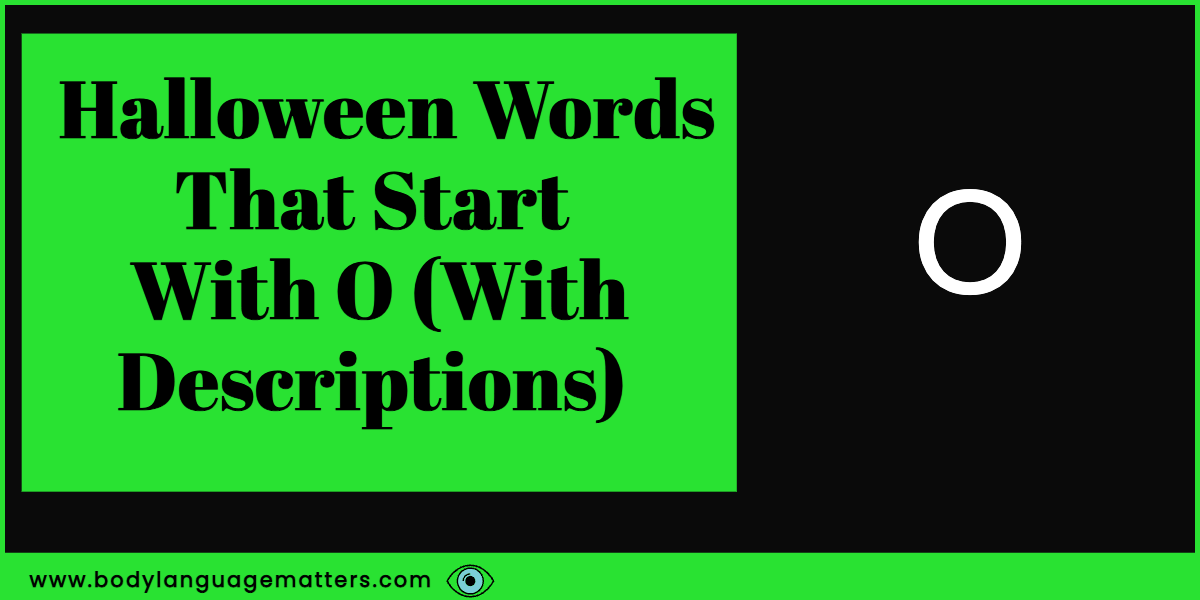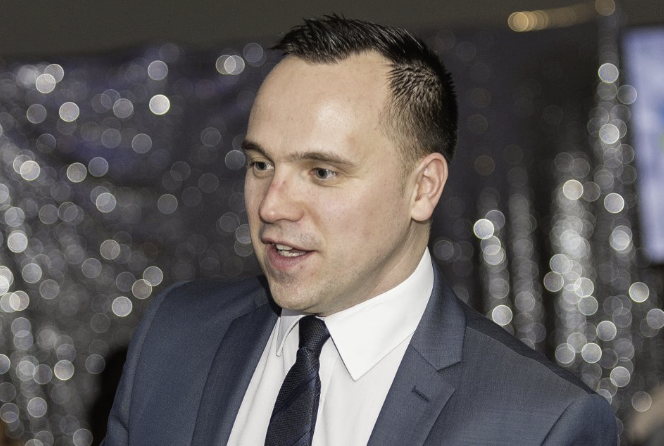Halloween is a great season to learn new vocabulary and expand our word choices. Some Halloween words that start with O include “Ouija,” “Occult,” “Oracle,” “Ogre,” “Onyx,” and “Ornament.”
Each of these words has a unique definition that adds that extra bit of spookiness to our Halloween conversations. For example, the word “Occult” refers to supernatural or supernatural phenomena that are not easily explained, while “Ogre” is a monstrous creature from folklore.
We need these words to create a more vibrant and detailed conversation about Halloween traditions, stories, and creatures. We can use these words in poems, songs, and scary stories during Halloween parties, and share them with our friends and family.
Expanding our Halloween vocabulary is not only fun, but it also helps us communicate more efficiently within the Halloween community.
79 Halloween Words That Start With The Letter O
| October: the month in which Halloween falls. |
| Orange: the color most commonly associated with Halloween. |
| Owl: a nocturnal bird often associated with Halloween and superstition. |
| Omen: a sign or warning of something ominous or negative. |
| Obsidian: a dark, volcanic rock often used in Halloween decorations. |
| Occult: relating to supernatural or mystical phenomena. |
| Onyx: a black gemstone often used in Halloween jewelry. |
| Outrageous: a word often used to describe over-the-top Halloween costumes. |
| Ogre: a monstrous creature often depicted in Halloween decorations and literature. |
| Offering: a gift or sacrifice made in honor of Halloween traditions or ancestors. |
| Ouija: a board game often associated with spiritualism and Halloween. |
| Opulent: a word often used to describe elaborate Halloween decorations or costumes. |
| Orphan: a child without parents or family often depicted in Halloween stories. |
| Organ: a musical instrument often used in spooky Halloween music. |
| Origin: the beginning or history of Halloween traditions. |
| Overwhelming: a word often used to describe the intensity of Halloween decorations or experiences. |
| Over-the-top: a phrase often used to describe excessive Halloween costumes or decorations. |
| Obelisk: a tall, pointed monument often associated with ancient Egyptian culture and Halloween. |
| Occasional: referring to Halloween as an annual event. |
| Obsequious: a word often used to describe servile or overly obedient behavior, as seen in some Halloween-themed stories. |
| Ordeal: a difficult or painful experience often associated with Halloween haunts or pranks. |
| Oracle: a source of wisdom or prophecy often associated with Halloween traditions. |
| Outcast: a person or creature shunned by society often depicted in Halloween stories. |
| Organic: referring to natural or earthy Halloween decorations or costumes. |
| Otherworldly: referring to supernatural or mystical Halloween themes. |
| Open-minded: a quality often encouraged during Halloween festivities, where people are encouraged to embrace diverse perspectives. |
| Oppressive: a word often used to describe the eerie or suffocating atmosphere of some Halloween haunts or stories. |
| Orchestration: the arrangement or coordination of various Halloween elements, such as music, decorations, and costumes. |
| Orderly: a word often used to describe well-organized Halloween festivities. |
| Overcast: a weather condition often associated with Halloween. |
| Outlandish: a word often used to describe bizarre or unconventional Halloween costumes. |
| Overwhelmingly spooky: a phrase often used to describe the intensity of some Halloween experiences. |
| Occultist: a practitioner of the supernatural often associated with Halloween traditions. |
| Oblique: a word often used to describe indirect or subtle Halloween symbolism. |
| Obscure: a word often used to describe mysterious or secretive Halloween traditions. |
| Odyssey: a long and eventful journey often depicted in Halloween stories. |
| Old-fashioned: a term often used to describe traditional Halloween decorations or costumes. |
| Otherworldliness: the quality of being supernatural or mystical often associated with Halloween. |
| Off-kilter: a word often used to describe unusual or unsettling Halloween imagery. |
| Onomatopoeia: a word that imitates a sound often used in spooky Halloween stories. |
| Opalescent: a word often used to describe the shimmering quality of some Halloween decorations. |
| Opponent: a rival often depicted in Halloween stories or games. |
| Oubliette: a dungeon-like cell often depicted in Halloween stories. |
| Occultism: the study or practice of the supernatural often associated with Halloween traditions. |
| Oversized: a word often used to describe larger-than-life Halloween decorations or costumes. |
| Oblivion: a state of being forgotten or ignored often depicted in Halloween stories. |
| Obsession: an intense preoccupation often depicted in Halloween stories or movies. |
| Obliteration: the act of destroying completely often depicted in Halloween stories or games. |
| Obnoxious: a word often used to describe annoying or unpleasant Halloween behavior. |
| Offbeat: a word often used to describe unconventional or quirky Halloween costumes or decorations. |
| Outrage: a feeling of anger or indignation often depicted in Halloween stories or movies. |
| Opaque: a word often used to describe a lack of clarity or transparency in Halloween imagery. |
| Occultation: the temporary disappearance of an object often associated with Halloween astronomical events. |
| Organic shapes: natural, flowing shapes often used in Halloween decorations. |
| Ornamentation: decorative details often used in Halloween crafts or costumes. |
| Outlaw: a criminal often depicted in Halloween stories or movies. |
| Overindulgence: excessive consumption often depicted in Halloween festivities. |
| Overpowering: a word often used to describe overwhelming Halloween decorations or experiences. |
| Occult symbols: mystical or supernatural imagery often used in Halloween decorations or costumes. |
| Ominous: a word often used to describe a sense of foreboding or danger in Halloween stories or movies. |
| Onslaught: a sudden, intense attack often depicted in Halloween stories or games. |
| Outspoken: a word often used to describe boldly expressed opinions or beliefs often depicted in Halloween stories or movies. |
| Obstacle: something that blocks progress or achievement often depicted in Halloween stories or games. |
| Over-the-moon: a phrase often used to describe ecstatic or overjoyed Halloween feelings. |
| Outwit: to defeat someone through cleverness or cunning often depicted in Halloween games or stories. |
| Open grave: a common Halloween decoration often associated with death or the afterlife. |
| Occult rituals: mystical or supernatural ceremonies often associated with Halloween traditions. |
| Occult knowledge: esoteric or secret information often associated with Halloween traditions. |
| Occult sciences: mystical or supernatural fields of study often associated with Halloween traditions. |
| Off with their heads: a phrase often associated with the Queen of Hearts in “Alice in Wonderland” and used in Halloween costumes or decorations. |
| Oppression: the exercise of power or control often depicted in Halloween stories or movies. |
| Obligatory: required or mandatory often depicted in Halloween traditions or festivities. |
| Octave: a musical term often used in spooky Halloween music. |
| Overexcited: a state of extreme excitement often depicted in Halloween festivities or games. |
| Obscured vision: impaired or obstructed sight often depicted in Halloween costumes or decorations. |
| Obscure references: hidden or unfamiliar details often used in Halloween symbolism or imagery. |
| Occult literature: books or writings about mystical or supernatural subjects often associated with Halloween traditions. |
| Occultist beliefs: mystical or supernatural beliefs often associated with Halloween traditions. |
| Over the top makeup: dramatic or exaggerated Halloween makeup often used in costumes or decorations. |
Final Thoughts.
When it comes to Halloween words that begin with the letter O we have listed a few Halloween-related words for you to look at in the holidays. Yep not all of them are creepy but it should get you into the spirit of things. Until next time thanks you for reading.

